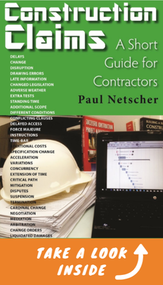Contractors should ensure they are paid for extra work Image courtesy of stockimages at FreeDigitalPhotos.net Image courtesy of stockimages at FreeDigitalPhotos.net Most construction projects will have changes, additional work and experience delays. Where the change or delay couldn’t be anticipated, or allowed by the contractor, they can usually claim a variation and request additional time and money from the client to recompense them for the event. But, the success of a variation claim isn’t guaranteed, and it’s up to the contractor to explain the cause of the variation, why they couldn’t have expected the event, and then quantify the impacts of the event. Now, this might seem simple and straightforward, but, regrettably, construction variation claims which are legitimate are frequently rejected by the client, or the contractor only receives part of what they are entitled to get. So where does it go wrong for contractors? Is it just because the client is being difficult or unfair? Occasionally, yes the client is being unfair and then there are usually legal steps that contractors can take when a legitimate and well thought through and presented variation claim is rejected. But, unfortunately, many construction variation claims lack substance and supporting documentation to justify the claim and the client has every right to reject the variation claim. Supporting documentation for your construction claim – what’s requiredMost contractors only think about supporting documentation when there’s a variation claim. By then, often the construction project has been going for several months. Much of the supporting documentation must come from events and days past, in fact some even from before the start of the construction project. Missing documents, or documents that are incorrect or faulty, will be of no use to support the variation claim. There are a number of supporting documents: The construction contract document forms the basis of the variation claim. It sets out the rights and obligations of the contracting parties and it informs the contractor of the steps to be taken when a variation claim arises. Unfortunately, some contractors only read their contract document when there’s a problem. Usually, by then it’s too late. Some construction contract documents are poorly written with conflicting and ambiguous clauses, while some documents unfairly put undue risks on the contractor and remove the contractor’s rights. Contractors must remember that the contract document outlines the project rules. These must be checked to ensure that they are fair before the contract document is accepted and signed – it’s too late to find part way through construction that the rules are unworkable, or unfair, or weren’t what the contractor thought they should be. Contractors must understand what their rights and obligations are, as well as the client’s rights and obligations. The contractor must make sure that everyone plays by the rules. The construction schedule is the yardstick against which any delay will be measured. The construction schedule should be a reasonable and logical assessment of how the project will be constructed and it should be in sufficient detail so that construction progress can be monitored and the impact of delays assessed. It should clearly indicate when the client must supply access, information, and materials. The contractor must follow the construction schedule. A poor construction schedule will make it difficult for the contractor to quantify the delay, while the contractor not following the schedule and using other construction methods could invalidate the variation claim. Weather records are essential when the contractor claims for delays to construction caused by adverse weather. Generally, normal weather events are a risk which the contractor must accept and they can’t claim for weather events which are the norm, or the average for the project location. So, how much rain did the construction project receive and was this more than average? If the contractor hasn’t maintained accurate weather records from the start of the project they might not be able to prove the exact amount of rain that fell on the project site unless there’s a weather station near the project. Daily logs or diaries. Often clients request the contractor maintains a daily log. But, even if they don’t, it’s good practice to maintain the diary. This log must be accurate and include the weather records, the resources on the project, construction delays and major events. Regrettably, many of these logs are not accurate and may not support the contractor’s variation claim. When did the delay start, when did it end, what did it impact? Project meeting minutes (records) often provide a record of progress and problems on the construction project. These minutes are often written by the client or their representative, and they frequently leave out information which is detrimental to them. It’s important to check that the meeting minutes are an accurate representation of what was discussed at the meeting and reflect the actual status of the project. If there’s an error or omission in the meeting minutes then the minutes should be rectified at the time, or the issue should be addressed in writing to the client. Contractors can’t wait until they are preparing their variation claim to find that the meeting records don’t support the facts in their claim. Personal diaries. Construction project staff often keep personal diaries recording the events on the project. These diaries can be subpoenaed by either party should a dispute arise. They may provide valuable information to support or refute a variation claim. These diaries should be an accurate reflection of events on the construction project. Request for information or engineering queries. From time to time the contractor will have questions for the client’s team. This could include missing, conflicting, unclear, or inaccurate information on construction drawings. All questions should be in writing so that there’s a record of the issue and when the matter was raised. The answer should be in writing with a date when it was received. Missing information and errors on construction drawings are a leading cause of delays on construction projects. Photographs provide a valuable record of the status of the project. They can be used to record construction equipment used for a particular task and also lack of access and problems on the construction project. It’s very difficult to refute a photograph with a date. Of course, the client can also use photographs to record the contractor’s errors, bad quality and poor production, which could be used to refute claims. Drawings and documents provided when the construction project was priced. All information provided to the contractor when they priced the construction project forms the basis for the contractor’s price. If the actual construction conditions and construction drawings are different, there may be the reason for a variation claim. It’s essential the contractor safely keeps all correspondence and documentation received when the project was priced and refers back to these documents in the course of construction to ensure that they claim for any changes which add time or costs to the project. Drawing registers. Construction drawing registers should record when drawings were received by the contractor. Regrettably, some registers record when the drawing left the client’s office, which could be a day or two before the contractor received the drawing. Drawing registers are essential to prove the quantum of a delay caused by late information from the client’s team. Drawing revisions. Clients and designers frequently revise drawings. This could even entail the contractor having to redo completed work or order additional or changed materials. It’s essential that revised drawings are kept (clearly marked as revised so they aren’t accidentally used for construction) so they can be referred to if the new drawing has resulted in a delay or additional work. Correspondence, which includes emails, instructions, memos, and letters. All instructions of a contractual nature (which ask for additional work, changes, or impact progress) must be in writing. Unfortunately, clients often have poor memories when it comes to money and additional time. These instructions and letters must have a date when they were received. The correspondence must be clear and unambiguous. Where necessary it may be necessary to, in writing, ask for clarity. Other documents could include, test results, handover and acceptance documentation, project reports, etc. All documents must be an accurate representation of the facts and the status of the project and have a date. Conclusion - ensuring your construction variation claim is successful...Continue Reading... This article was first published on the ClockShark website. To visit this website and continue reading the article click on the link above. Please share this post  For more valuable information on construction claims get your copy of the author's book 'Construction Claims: A Short Guide for Contractors' which is an easy to read concise guide to helping you win your variation claims ensuring that you are paid for all your extra work and compensated for delays beyond your control To read more about the author’s books and find out where you can purchase them visit the pages on this website by clicking the links below:
To read more about the author visit the page 'Paul Netscher' Want to contact Paul Netscher please enter your details on 'Contacts' Find out how Paul Netscher can help you construction management construction project management
0 Comments
Leave a Reply. |
Archives
June 2024
Note: We welcome genuine comments, especially comments that add additional information to the subject matter in the article. We however reserve the right to remove inappropriate comments, which includes comments that have nothing to do with the subject, comments that include inappropriate language, and comments that are an advertisement for a product or company, or which include an advertising link. Comments must be in English. We will not enter into discussion on why a particular comment was removed.
CategoriesCopyright 2016 - The attached articles cannot be reproduced for commercial purposes without the consent of the author.
The opinions expressed in the attached articles are those of the writer. It should be noted that projects are varied and different laws and restrictions apply which depend on the location of the contractor and the project. It's important that the reader uses the supplied information taking cognisance of their particular circumstances. The writer assumes no responsibility or liability for any loss of any kind arising from the reader using the information or advice contained herein. "I have what I consider some of the best books on construction management."
Books are available from: Amazon.com Amazon.co.uk takealot.com kalahari.com Amazon.in Amazon.de Amazon.fr Amazon.it Amazon.com.au Powell's Fishpond uread bokus Amazon.ca Amazon.es Other retail stores Available in paperback or on Kindle "28 YEARS OF CONSTRUCTION PROJECT MANAGEMENT EXPERIENCE, DEVELOPING SUCCESSFUL CONSTRUCTION PROJECT MANAGERS AND BUILDING SUCCESSFUL CONSTRUCTION COMPANIES"
|



 RSS Feed
RSS Feed




